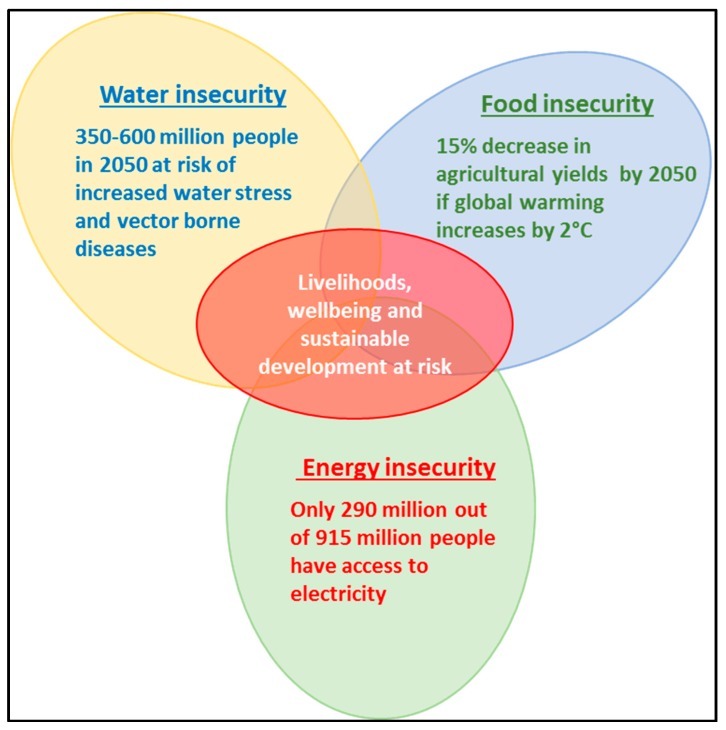Publication // The Water-Energy-Food Nexus as a Tool to Transform Rural Livelihoods and Well-Being in Southern Africa
By Tafadzwanashe Mabhaudhi, Luxon Nhamo, Sylvester Mpandeli, Charles Nhemachena, Aidan Senzanje, Nafisa Sobratee, Pauline Paidamoyo Chivenge, Rob Slotow, Dhesigen Naidoo, Stanley Liphadzi, and Albert Thembinkosi Modi. In their study, the authors develop WEF nexus indicators and composite indices for Southern Africa, highlighting the unsustainability of current resource utilisation and management in the region; mainly due to the siloed sectoral approach to resource management. Their WEF nexus approach emphasises the trade-offs and unintended consequences of current approaches, with direct negative consequences for poor rural households in terms of resource security and well-being, but, at the same time indicating priority areas for intervention.

WEF nexus livelihoods adaptation and transformation framework. © Mabhaudhi et al.
Abstract
About 60% of southern Africa’s population lives in rural areas with limited access to basic services and amenities such as clean and safe water, affordable and clean energy, and balanced and nutritious diets. Resource scarcity has direct and indirect impacts on nutrition, human health, and well-being of mostly poor rural communities. Climate change impacts in the region are manifesting through low crop yields, upsurge of vector borne diseases (malaria and dengue fever), and water and food-borne diseases (cholera and diarrhoea). This study applied a water–energy–food (WEF) nexus analytical livelihoods model with complex systems understanding to assess rural livelihoods, health, and well-being in southern Africa, recommending tailor-made adaptation strategies for the region aimed at building resilient rural communities. The WEF nexus is a decision support tool that improves rural livelihoods through integrated resource distribution, planning, and management, and ensures inclusive socio-economic transformation and development, and addresses related sustainable development goals, particularly goals 2, 3, 6 and 7. The integrated WEF nexus index for the region was calculated at 0.145, which is marginally sustainable, and indicating the region’s exposure to vulnerabilities, and reveals a major reason why the region fails to meet its developmental targets. The integrated relationship among WEF resources in southern Africa shows an imbalance and uneven resource allocation, utilisation and distribution, which normally results from a ‘siloed’ approach in resource management. The WEF nexus provides better adaptation options, as it guides decision making processes by identifying priority areas needing intervention, enhancing synergies, and minimising trade-offs necessary for resilient rural communities. Our results identified (i) the trade-offs and unintended negative consequences for poor rural households’ livelihoods of current silo approaches, (ii) mechanisms for sustainably enhancing household water, energy and food security, whilst (iii) providing direction for achieving SDGs 2, 3, 6 and 7.

Keywords
climate change, livelihoods, innovation, human well-being, WEF nexus, adaptation, health
Published
August 2019
By
Int J Environ Res Public Health. 2019 Aug; 16(16): 2970
Citation
Mabhaudhi, Tafadzwanashe et al. “The Water-Energy-Food Nexus as a Tool to Transform Rural Livelihoods and Well-Being in Southern Africa.” International journal of environmental research and public health vol. 16,16 2970. 18 Aug. 2019, doi:10.3390/ijerph16162970
Download
Related Resources
- Publication // Development of Water-Energy-Food Nexus Index and its Application to South Africa and the Southern African Development Community
- Publication // An integrative analytical model for the water-energy-food nexus: South Africa case study
- Publication // Sustainability Indicators and Indices for the Water-Energy-Food Nexus for Performance Assessment: WEF Nexus in Practice – South Africa Case Study
- The Water–Energy–Food Security Nexus // Challenges and Opportunities for Food Security in South Africa
- Publication // Climate and Southern Africa's Water-Energy-Food Nexus
